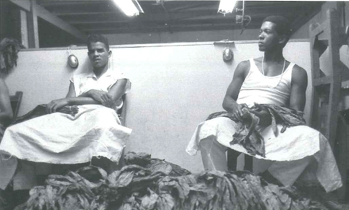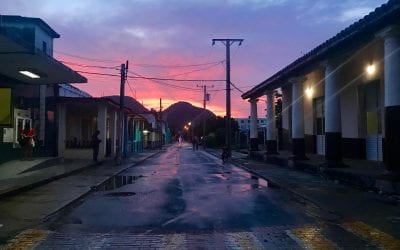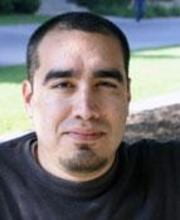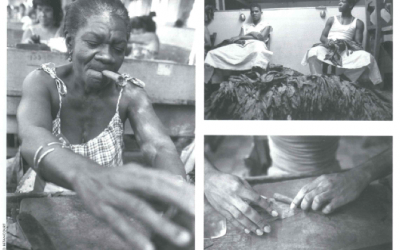Cuba and African Diaspora Religion

By Alfredo Betancourt
Some of the most important religions of the African diaspora developed in Cuba and Brazil, where millions of captives from the West African Bight of Benin were forcibly resettled in the 19th century. In turn, since the 1959 Cuban Revolution, thousands of Cubans have fanned across the Americas, turning San Juan, Bogotá, Miami and New York City into international capitals of oricha-worship.
In the United States in particular, this Afro-Cuban religion has not simply endured. It has attracted enormous classes of Cubans who would have avoided it in pre-revolutionary Cuba, as well as non-Cuban Latino immigrants who had known nothing of it in their homelands and African Americans who regard it as a way to “recover” their own ancestral African culture. Moreover, here in the U.S., the unique challenges of racial binarism have created revolutionary conflicts, and changes, in the practice of Afro-Cuban religion.
I’ve studied, taught, and written about the Yoruba religion and its New-World counterparts-such as Lucumí in Cuba and Candomblé Nagí´ in Brazil-since 1980. Lucumí is by far the most prestigious of the Afro-Cuban religions, just as Candomblé Nagí´ is the most prestigious of the Afro-Brazilian religions. It was the need to explain this “Yoruba” preeminence that inspired my paper “The New Yoruba Empire: Texts, Migration, and the Trans-Atlantic Rise of the Lucumí Nation” presented in January 1999, at a conference co-sponsored by the Juan Marinello Center in Havana with Harvard’s David Rockefeller Center for Latin American Studies.
Because I traveled to Cuba before the conference began, I spent ten days with some wonderful Cuban santeros andbabalaos (as the Lucumí priests are known). My new friends introduced me to a distinctively Cuban experience of this religion of song, dance, divination, animal sacrifice, and spirit possession. I learned from these priests how the transcendent understandings cultivated in this religion empower them in present-day Cuba. I offered in exchange, songs, tales, and photographs from my field research among their coreligionists in other countries.
I continue to study the religion not only in West Africa, Brazil, and the Caribbean but also among Cuban exiles, Latinos generally, African Americans, and Euro-Americans who have adapted Lucumí religion to U.S. circumstances. Moreover, I take these diverse regional adaptations to illustrate some general principles about cultural reproduction across space and time.
Specifically, I have attempted to relate the success of Yoruba religion not simply to its “survival” and recollection by generation of captives and their descendants but to an ongoing African history that distinguishes Yoruba culture from other African cultures that also appear to have “survived” in the Americas. I argue that it was the Lagosian Renaissance of the 1890s-an Afro-British-inspired literary and cultural movement in Lagos, West Africa-that reified Yoruba culture and argued for its unique dignity.
These developments took place at the hands of highly westernized Africans and returnees from the diaspora who had enjoyed a highly cooperative relationship with British colonialists in West Africa during the mid-19th century. However, a late-19th-century economic turndown and a crescendo in British colonial racism prompted these westernized black people to Africanize their names, adopt African modes of dress, endorse African marital practices, and pen an unprecedented documentary literature demonstrating the dignity of an African religion.
In the same way, the Lagosian Renaissance also established the particular utility of the emergent Yoruba culture, and its religion, in the project of racial nationalism around the Atlantic perimeter. The books produced during this Renaissance and the travlers who bore thm to Latin America in turn transformed American elites’ thinking about at least this one African-diaspora religion. They gave it a public prestige and recognition unavailable to other diasporic religions such as Palo Mayombe, Abakwa, Macumba, and Candomblé Angola.
With this kind of historical revision, we begin to understand that diasporas do not simply inherit primordial traditions and transmit them by memory, survival and retelling. Rather, they reformulate available cultural repertoires and adapt them to new purposes, often through literary and political movements.
Caribbean Latinos, Latinos in general, and native African Americans, are now reformulating Yoruba and Yoruba-related cultural repertoires, adapting them to new political projects and literary media in the United States. For example, formerly Protestant African Americans have sought to purify Lucumí of its Catholic influences, and, given their linguistic and racial exclusion from Latino religious circles, African Americans have generated a catecistical literature of unprecedented size and vernacular clarity. Moreover, reacting against the privileges associated with whiteness in the United States, African Americans and Afro-Cubans in the U.S. have begun to question the authority of “white” Cubans who have also propagated and defended Lucumí practices. Thus, the Lucumí religion is being shaped yet again, this time in response to U.S. racial ideology and African-American culture.
The santeros I met last year in Cuba not only helped me to understand the religious traditions of the island, but also introduced me to Colombian, Panamanian, Puerto Rican, and other U.S. santeros who come to Cuba on pilgrimage and for initiation, creating new webs in intellectual and material exchange.
Perhaps even more than the remittances of funds by Cuban families abroad, these pan-American webs of spiritual kinship have revitalized Cuban culture-in this case, by giving new legitimacy to a religion once condemned by the socialist state. The Cuban state now recognizes Lucumí religion as it recognizes no other Afro-Cuban or Euro-Cuban religion, as a fully legitimate conduit of foreign exchange, an approved form of socio-political organization, and a core element of national folklore.
With the Cuban santeros and babalaos, I shared much that I had learned of their religious brothers and sisters during my field work in Brazil, Nigeria, Benin Republic, and the United States. I cannot say, however, that I did as much for them as they did for me. They nourished my mind and my body with a uniquely Cuban warmth and generosity. some of these quandaries and challenges. They were generous and taught me so much. I trust that our new friendship will endure for many decades to come.
Winter 2000
J. Lorand Matory, a member of the DRCLAS Policy Committee, is Professor of Anthropology and of Afro-American Studies at Harvard University. A longer version of this article was presented at a January 1999 conference co-sponsored by the Juan Marinello Center in Havana and DRCLAS, with the support of the John D, and Catherine I. MacArthur Foundation.
Related Articles
Isabelle DeSisto: Student Perspective
encountered the first obstacle of my trip to the Isla de la Juventud before I even left Havana. Since American credit cards don’t work in Cuba, I couldn’t buy my plane tickets online. But that…
Honoring Humanity: An “Interview” with Richard Mora
Mauricio Barragán Barajas: Why don’t we begin by having you introduce yourself? RM: Alright. I was born in East Los Angeles, and grew up in Cypress Park, a barrio in…
Tobacco and Sugar
“Tobacco and Sugar” is the course that focuses American literatures on the Caribbean, and that acknowledges the unavoidable importance of monocultures for cultural studies. Much of the…




